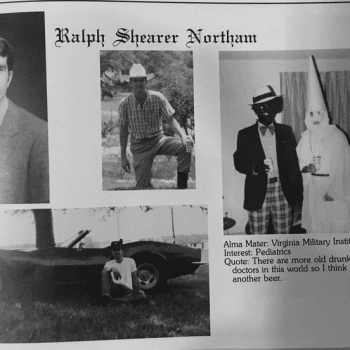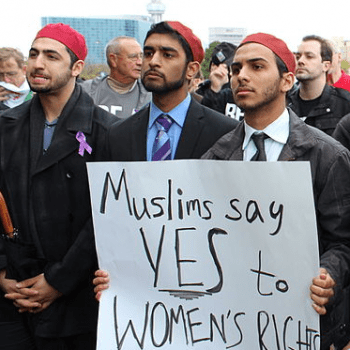
Tuesday the Supreme Court heard the case of a Jack Philips, a baker from Denver who refused to bake a cake for a gay couple claiming that it violated his religious beliefs and moral sensibilities. In a op-ed in USA Today, Jack writes, “Designing a wedding cake is a very different thing from, say, baking a brownie.” And he’s not talking about the number of eggs or types of frosting.
Rather, he says, “what I design is not just a tower of flour and sugar, but a message tailored to a specific couple and a specific event — a message telling all who see it that this event is a wedding and that it is an occasion for celebration. (…) The First Amendment defends my right to create custom cake art that is consistent with my faith, while declining requests that ask me to celebrate events or messages that conflict with my faith.”
Reasonableness doesn’t make it Right
Jack’s argument sounds reasonable. He shouldn’t be required to do something that violates his moral sensibilities, right?
Wrong! Jack’s argument arises out of deep misunderstanding of what he was being asked to do. He, in fact, wasn’t asked to celebrate anything. He wasn’t asked to be a member of the wedding party. He wasn’t invited to attend the ceremony or to bless the union. He wasn’t asked to put a personal message of felicitation on the cake. Jack was asked to bake and decorate to order, period.
Moreover, he wasn’t being paid with joy, happiness, or glasses of champagne. He was being paid with cash, and lots of it if their cake was anything like my own wedding cake. Though Jack thinks it was not just a business transaction, in fact it was just a business transaction.
Furthermore, what happens to the cake after it’s been paid for is not Jack’s concern. Once it left his shop, the new owners could take it to their wedding, give to a homeless shelter, smash it in a food fight, or even throw it in the trash if they so desired. It’s not Jack’s business to make sure what they use it for with it lines up with his personal morality.
But What about the First Amendment?
Jack is also mistaken about what the First Amendment says. While it embodies the principle of individual freedom of conscience, the First Amendment does not say that Jack can do whatever he likes as long as it’s part of his belief system. What it does say is that the government cannot establish a state religion, prefer one religious institution over another, or ban a religion. Indeed, the First Amendment prohibits the government from making a law or ruling that gives preference to Jack’s morality over the morality of the couple he refused to serve. It has to remain neutral when it comes to the religious morality of gay marriage.
As much as some people may not like it, America is a secular country. Which means that our laws are based on socially agreed upon public good, not religious authority. Our secularism protects individual rights like life, liberty, pursuit of happiness. It means that Americans can believe whatever they like, but that religious beliefs and morality are private issues not a public or legal ones. And, while you can try to convince people that your morality is in the public good, you cannot impose your morality on them because they have the same freedom of conscience that you do.
Jack wasn’t just following his own morality, he was impeding the gay couple’s right to do business and pursue their own happiness simply because he didn’t like their free exercise of their morality.
Back Down the Slippery Slope?
Refusing to serve others on the basis of religious belief or morals isn’t anything new. Restaurant owners, cashiers, and retail establishments have declined to serve Blacks, the Irish, Catholics, Jews, Muslims, women, Latinos, interracial couples, gays, etc, etc. because their religious sensibilities were offended by members of these groups. They too were trying to impose their morality on their clients, and were denying them the basic right to the pursuit of happiness. As a Muslim, a woman, and a person whose first marriage would have been illegal when I was born, I’m very glad our government has begun taking our secularism more seriously since the Civil Rights movement.
Unfortunately, the Christian Right and others in our country are trying to take us back down the slippery slope. If it is permissible to discriminate against gay couples buying a cake, transsexual students needing a lavatory, or a lesbian employee who wants health insurance for her spouse, we are only a few steps away from Home Depot and Chick Fil-A being allowed to refuse employment to people who don’t uphold their Christian values, including any Muslim, Jew, Hindu, or Buddhist. We are only steps away from Muslim hotel owners being empowered to demand a marriage certificate before they will book a room for a couple because the hotelier doesn’t want to facilitate any potential pre- or extra-marital sex. Do we really want to live in that world? I know I don’t.
Update 12/6/2017: Sarah Sanders, Trump’s Press Secretary of the moment, has stated that Trump doesn’t have any problem with businesses hanging signs that announce they refuse to serve the glbt community on the grounds that he believes in freedom of religion. Apparently our president is actively trying to take us back to the era when signs reading, “no coloreds,” “Irish need not apply” or “whites only” were common place.
In the fever to protect the religious freedoms of those who would discriminate against other, law abiding citizens and interfere with their right to pursue their own happiness, we have lost sight that our freedom ends when it imposes on the freedoms and rights of other people. People can believe whatever they like about the glbt community. They can hate whomever they like. But they have no right to impose that belief on others, or to refuse them basic human services. Those of us who adhere to a religious belief that it’s ok to be queer, to marry the person you love, and to live openly as you are have just as much right to our religious freedoms and to pursue the endeavors necessary to human life — purchasing goods, renting or purchasing a place to live, marrying who we like, raising children, etc. I, for one, as a straight ally, will not be visiting any shops that post “no gays here” and I encourage all people of conscience and good faith to join me.











